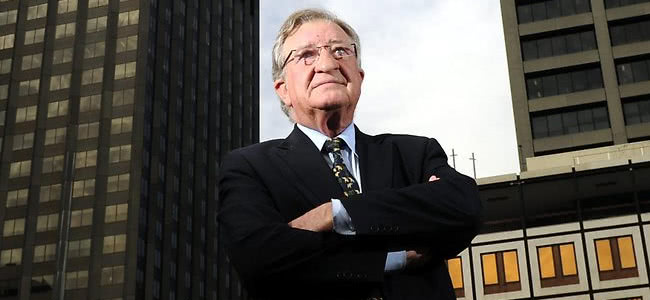As the campaigning begins in Melbourne for the next mayoral term, candidate John Elliot has voiced his views on the recent precedence set by Sydney’s introduction of a police state view of venue restrictions, with plans to introduce a 1am lockout for all nightclubs and venues – including those that host live music.
The former boss of Carlton & United Breweries took to the streets to voice his unease surrounding the issue of weekend street violence, which Elliot says is a concern for inner city residents who are often living in fear with the looming thought of dealing with late night violence that stems from the venues which host late night events, such as gigs.
His proposed 1am lockout has an obvious knock-on effect to live music venues who often host their events late into the night, with Mr Elliott representing, “a lot of talk about night-time and people with knives and all the trouble we have on Friday and Saturday nights.”
“I think we have got to go to the state government. I am all in favour of closing all of the nightclubs by 1am,’’ Mr Elliot told The Age. “I really believe that is a very important thing to do… we have got to make it easier for the police to deal with it.”
Adding that it was ‘‘bad everywhere. That’s what the residents complain about. A lot of people work in the city of Melbourne go off to their suburban homes and they don’t see the problem, it is the residents who live here in the city, they experience it all the time, it is not a very safe place in certain areas.”
Mr Elliot’s concern is shared by many other cities, including Sydney, who has seen many politicians campaign to have a 2am venue lockout instated across all venues – live music hosting or otherwise – with residential safety being the hot topic.
Liquor licensing and music venues have become a political platform ever since the recent influx of street violence on Sydney’s notorious nightclub mecca, Kings Cross, crafting the issue of alcohol-related violence as a political platform for pokie-lined pub venues and politicians alike.
Street violence, which has actually decreased in the last five years, has now become an issue used to shift blame to nightclubs and venues. But a 1am lockout at popular night spots could not only displace the problem rather than solve it – it could actually make it worse.
Pouring the large numbers onto the streets at the same time has been shown to exaggerate these problems, as it did when the previous Victorian government trialled a 2am lock out for all licensed venues.
The lock out was eventually scrapped after a report commissioned by the government found there had actually been an increase in alcohol-related violence during the period of the temporary lock out.
In particular the report found that there has been an increase in reported assaults between the hours of midnight and 2am when compared to the corresponding period in 2007, and a small increase compared to the lead-in period.
The report also found a similar pattern between 2am and 3.59am; with an increase in assault related ambulance transports between 8pm and midnight when compared to the three-months prior to the temporary lockout.
The lock out was also a logistical nightmare for the government, with many venues pursuing and winning legal action for exemptions to the scheme. Mr Elliot hasn’t gone into details about how his plan would work, and it remain unclear whether provisions will be made to exclude venues who have proven track records of little to no violence.
Mr Elliott’s proposal comes as New South Wales Premier Barry O’Farrell leads a crackdown of Sydney’s licensed venues and new restrictions on trading including mandatory ID scanning and the use of sniffer dogs on the street.
It appears to be another example of politicians nation-wide looking for a quick fix to issues, such as Sydney’s response to street violence, while the SA Government’s response to problems with late-night culture in Adelaide has resulted in going for liquor and licensing changes without first addressing the inherently ridiculous laws that are systemic to their city’s policies.

































